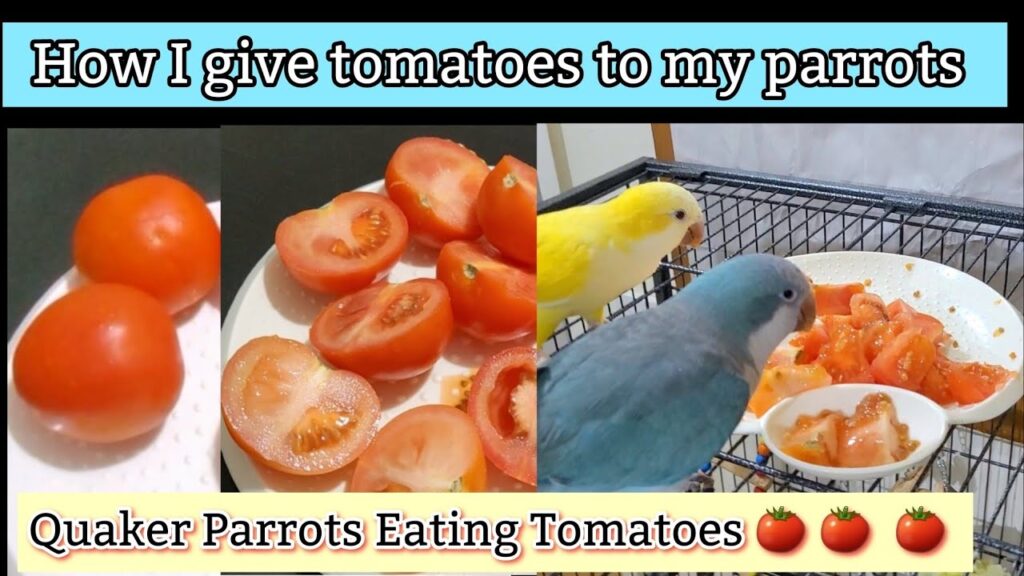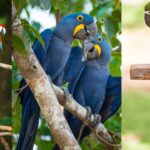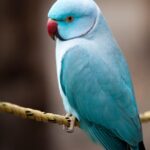Parrots can eat tomatoes in moderation. Tomatoes should be served ripe and without seeds or leaves.
Parrots enjoy a variety of fruits and vegetables in their diet. Tomatoes provide essential vitamins and nutrients, making them a beneficial treat. Always ensure tomatoes are ripe and free from leaves and stems, as these parts can be toxic. Introduce tomatoes gradually to your parrot’s diet and observe for any adverse reactions.
Offering tomatoes occasionally, alongside a balanced diet, can enhance your parrot’s overall health. Remember, moderation is key to preventing any potential issues. Regularly consult with a veterinarian to ensure your parrot’s diet meets all its nutritional needs. This way, you can keep your feathered friend happy and healthy.

Credit: pangovet.com
Nutritional Benefits Of Tomatoes
Tomatoes are not just tasty; they offer many health benefits. For parrots, tomatoes can be a great source of essential nutrients. This section explores the nutritional benefits of tomatoes for your feathered friends.
Vitamins And Minerals
Tomatoes are rich in essential vitamins and minerals:
- Vitamin C: Boosts the immune system.
- Vitamin A: Supports eye health.
- Vitamin K: Helps in blood clotting.
- Potassium: Maintains heart health.
- Folate: Aids in red blood cell formation.
These vitamins and minerals are crucial for a parrot’s overall health. They help keep your parrot healthy and energetic.
Antioxidants
Tomatoes contain important antioxidants:
- Lycopene: Reduces inflammation.
- Beta-carotene: Enhances vision.
- Vitamin C: Fights free radicals.
Antioxidants help protect your parrot’s cells from damage. They also improve the parrot’s immune system, keeping them vibrant.
Potential Risks Of Feeding Tomatoes
Feeding tomatoes to parrots might seem harmless, but there are risks involved. Understanding these risks is crucial to keeping your feathered friend healthy. Let’s explore some of the potential dangers.
Toxic Components
Tomatoes have parts that can be toxic to parrots. The green parts, like stems and leaves, contain solanine. Solanine is a toxic compound that can harm your parrot. Even small amounts can cause serious health problems.
| Tomato Part | Risk Level |
|---|---|
| Leaves | High |
| Stems | High |
| Ripe Fruit | Low |
Always remove all green parts before offering tomatoes. This reduces the risk of poisoning.
Gastrointestinal Issues
Tomatoes are acidic and can upset a parrot’s stomach. Acidic foods can cause gastrointestinal distress. Symptoms include vomiting, diarrhea, and discomfort.
- Vomiting
- Diarrhea
- Discomfort
Always monitor your parrot after introducing new foods. If symptoms appear, consult a vet immediately. Keep your parrot’s diet balanced and safe.
Safe Tomato Parts For Parrots
Tomatoes can be a tasty treat for parrots. However, knowing which parts are safe is essential. Some parts of the tomato can be harmful. Let’s explore the safe parts for your feathered friends.
Flesh And Skin
The flesh and skin of tomatoes are safe for parrots. They are rich in vitamins and provide good hydration. Always wash the tomatoes thoroughly before serving. Cut them into small pieces to make eating easier for your parrot.
Avoiding Seeds And Leaves
It’s crucial to avoid the seeds and leaves of tomatoes. These parts contain harmful substances. Tomato seeds have small amounts of toxins that can be dangerous for parrots. The leaves and stems contain solanine, which is toxic to birds.
- Remove all seeds before serving.
- Dispose of leaves and stems properly.
- Check the tomato for any remaining seeds.
| Part of Tomato | Safe for Parrots |
|---|---|
| Flesh | Yes |
| Skin | Yes |
| Seeds | No |
| Leaves | No |
| Stems | No |
Always ensure your parrot’s safety by following these guidelines. Happy feeding!
Preparing Tomatoes For Parrots
Preparing tomatoes for parrots requires careful attention to ensure their safety and health. Tomatoes can be a nutritious treat for parrots if prepared properly. This section will guide you through the essential steps to prepare tomatoes for your feathered friends.
Washing And Cutting
Before serving tomatoes to your parrot, it’s crucial to wash them thoroughly. This step removes any pesticides and dirt from the surface.
Use cold water and gently rub the tomatoes. A soft brush can help to clean the skin. After washing, use a clean knife to cut the tomatoes into small, bite-sized pieces. Remove any seeds and the green stem, as they can be harmful.
Portion Control
Parrots should only eat tomatoes in moderation. Too many tomatoes can upset their stomach. A small portion of tomato once or twice a week is usually sufficient. Monitor your parrot’s reaction and adjust the portion size if needed.
Refer to the table below for appropriate portion sizes based on your parrot’s size:
| Parrot Size | Tomato Portion |
|---|---|
| Small (e.g., Budgies) | 1-2 small pieces |
| Medium (e.g., Cockatiels) | 2-3 small pieces |
| Large (e.g., Macaws) | 3-4 small pieces |
By following these simple steps, you can safely introduce tomatoes to your parrot’s diet. Always observe your parrot after feeding new foods and consult a vet if you notice any adverse reactions.
Signs Of Tomato Toxicity
Tomatoes are a popular fruit, but are they safe for parrots? Knowing the signs of tomato toxicity is crucial for bird owners. While ripe tomatoes can be safe in small amounts, the leaves, stems, and unripe tomatoes can be toxic. Let’s explore the symptoms and actions to take if your parrot eats a toxic part of a tomato.
Symptoms To Watch For
Recognizing the symptoms of tomato toxicity is vital for your parrot’s health. Here are some key signs to watch for:
- Vomiting: Your parrot may regurgitate its food.
- Diarrhea: Loose stools can indicate a problem.
- Lethargy: Lack of energy or unusual tiredness.
- Loss of Appetite: Your parrot may refuse to eat.
- Seizures: Severe cases may lead to convulsions.
Immediate Actions
If you suspect your parrot has ingested a toxic part of a tomato, quick action is essential:
- Remove the Source: Take away any remaining tomato parts.
- Contact a Vet: Call your avian veterinarian immediately.
- Observe Your Parrot: Monitor for any worsening symptoms.
- Follow Vet Instructions: Your vet may suggest bringing your parrot in for treatment.
| Symptom | Action |
|---|---|
| Vomiting | Contact vet immediately |
| Diarrhea | Monitor and call vet |
| Lethargy | Ensure parrot rests, call vet |
| Loss of Appetite | Offer fresh water, call vet |
| Seizures | Emergency vet visit |

Credit: pangovet.com
Alternatives To Tomatoes
Parrots enjoy a variety of foods, but some may not be safe. Tomatoes can be risky due to their acidity. Luckily, there are many healthy alternatives for your feathered friend.
Other Safe Fruits
Many fruits are safe for parrots and can replace tomatoes. Here’s a list of great options:
- Apples (without seeds)
- Bananas
- Blueberries
- Mangoes
- Oranges
- Papayas
- Pineapples
- Strawberries
These fruits are rich in vitamins and minerals. They also provide essential nutrients for your parrot’s health.
Vegetable Options
Vegetables are another excellent alternative to tomatoes. Here are some safe vegetable choices:
| Vegetable | Nutritional Benefits |
|---|---|
| Carrots | High in Vitamin A |
| Broccoli | Rich in Fiber and Vitamin C |
| Spinach | Contains Iron and Calcium |
| Bell Peppers | Full of Vitamins A, C, and E |
| Zucchini | Low in Calories, High in Antioxidants |
These vegetables are safe and nutritious for your parrot. They help maintain your bird’s health and happiness.
Consulting A Vet
Parrots can be curious eaters. Tomatoes might seem tasty to them. But are they safe? Consulting a vet is crucial before introducing new foods to your parrot’s diet. A vet can provide expert advice tailored to your bird’s health needs.
Importance Of Professional Advice
Veterinarians know what’s safe for your parrot. They understand bird nutrition better than anyone. They can tell if tomatoes are harmful. They can suggest safer alternatives too.
A vet’s advice can prevent health issues. They can spot problems early. This helps in keeping your parrot healthy and happy.
Regular Health Check-ups
Regular check-ups are vital for parrot health. Schedule visits at least twice a year. During these check-ups, vets can monitor your parrot’s diet.
Health check-ups can catch issues early. Early detection can save your parrot’s life. It ensures they stay active and happy.
Here is a simple check-up schedule:
| Month | Check-up |
|---|---|
| January | Full health check |
| July | Diet and weight check |
- January: Full health check
- July: Diet and weight check
Regular visits help in adjusting diet plans. These adjustments ensure your parrot gets the best nutrition.

Credit: www.youtube.com
Conclusion
Parrots can safely eat tomatoes in moderation. Always remove the green parts, as they are toxic. Fresh, ripe tomatoes offer vitamins and hydration. Monitor your parrot for any adverse reactions. Including tomatoes in their diet can be beneficial. Remember to consult your vet for tailored advice on your parrot’s diet.
Ryan Everhart is a passionate bird enthusiast and blogger, primarily writing on his website, Avian Whispers. His journey into the world of bird blogging began with a deep interest in parrots, a species that captivated his attention for their intelligence and social behavior. Over time, his content expanded to cover a broader range of bird species, offering insights into bird behavior, care, habitats, and conservation.
Ryan is dedicated to educating his audience, which includes both new bird owners and seasoned enthusiasts. His writing is filled with personal experiences, expert knowledge, and practical advice on bird care. Through Avian Whispers, he aims to foster a deeper appreciation for birds, emphasizing their role in nature and the joys of having them as pets.
Starting with articles focused on parrots, Ryan’s work now encompasses a diverse range of topics such as feeding, training, habitat enrichment, and bird health. His love for birds extends beyond parrots, diving into various avian species. His informative and heartfelt writing reflects his commitment to the well-being of birds and the desire to help others connect with these creatures.
As a growing voice in the bird blogging community, Ryan strives to provide a platform where bird lovers can learn, share experiences, and connect over a shared passion for avian life. His blogs are not only educational but also serve as a reminder of the importance of protecting and nurturing the bond between humans and birds.




